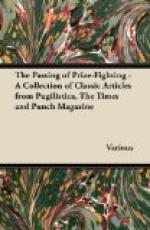As I have always expected to do, but have never yet done, I missed my footing at the top of the escalator, and my desire to outstrip my enemies was realised beyond my wildest hopes as I crashed, by a series of petrifying somersaults, down the entire flight, to be belched forth like a sausage from a machine at the bottom.
Tattered, torn and in unspeakable agony I picked myself up and found my steering-gear so damaged that I could only move sideways, crab-fashion, and in this manner I crawled on to the platform just as a train was beginning its exit.
I make a leap for it. The gates crash to! Am I inside them or out? Neither. I am pinned there with the first half of my body struggling inside the car while the second half protrudes over the fast-receding platform.
I remember how in my agony it flashed across my mind that I would never again slay a wasp with my fork.
I must have been pulled into the car just in time to stop the tunnel (which is a dreadfully close fit) from bisecting me, for the next thing I remember was being dropped into a corner seat and severely admonished by the guard for getting into the train whilst it was in motion.
I was now a quivering and shapeless mass; nobody pitied me, nobody helped me, so loathsome a spectacle did I present.
Of course the train passed my station, and at the next I was thrown out like a mail-bag, to be trodden on by massed formations of travellers fighting to enter and leave the car by the same door at the same time.
When the multitudes had dispersed and I was alone, by superhuman efforts I contrived to wriggle on my stomach to the foot of the ascending stairway, but not having sufficient strength to wriggle off on arrival at the top, my long-dreaded horror of being sucked under the barrier, where moving stairways disappear, was realised.
By now immune to pain, I regarded the next process (akin to being passed through a mangle) as child’s play. To my amazement, after a few minutes amongst giant cog-wheels, I again found the light on the down-going staircase, which precipitated me to the spot from which I had started.
Having thrice performed this revolution, by which time I was as flat as a pancake, I was eventually scraped off by a porter and upbraided for joy-riding.
Finding that those rebukes left me unmoved, for I was practically lifeless, certainly boneless, and, to their horror, ticketless, they folded me up and put me in a drawer pending the arrival of the police.
I was still there when the dream mercifully stopped.
* * * * *
[Illustration: Motor Cyclist. “WHY THE DEUCE DON’T YOU DRIVE ON THE PROPER SIDE OF THE ROAD?”]
* * * * *
BIRD-LORE.
II.—PEACOCKS.
Peacocks sweep the fairies’ rooms;
They use their folded tails for brooms;
But fairy dust is brighter far
Than any mortal colours are;
And all about their tails it clings
In strange designs of rounds and rings;
And that is why they strut about
And proudly spread their feathers out.




